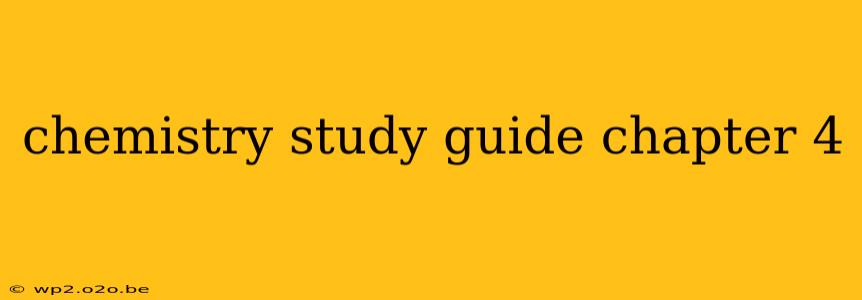This comprehensive study guide covers the key concepts typically found in Chapter 4 of most introductory chemistry textbooks. While specific topics may vary slightly depending on your textbook, this guide will provide a solid foundation for understanding fundamental chemical principles. Remember to always consult your textbook and lecture notes for the most accurate and detailed information specific to your course.
Key Concepts Typically Covered in Chapter 4 of Introductory Chemistry Textbooks:
This chapter often builds upon the foundations laid in previous chapters, focusing on the quantitative aspects of chemistry. Expect to encounter topics such as:
1. Stoichiometry: The Heart of Chemical Calculations
Stoichiometry is the cornerstone of many chemical calculations. This section will likely cover:
-
Moles and Molar Mass: Understanding the mole concept as a fundamental unit of measurement in chemistry, and calculating molar masses from atomic weights. Mastering this is crucial for all subsequent stoichiometric calculations.
-
Percent Composition: Determining the percentage by mass of each element in a compound. This involves calculating molar mass and using proportions.
-
Empirical and Molecular Formulas: Distinguishing between empirical (simplest whole-number ratio of atoms) and molecular formulas (actual number of atoms in a molecule). You'll learn how to determine these formulas from experimental data, such as percent composition or combustion analysis.
-
Balancing Chemical Equations: This crucial skill is essential for all stoichiometric problems. You need to ensure that the number of atoms of each element is the same on both sides of the equation, representing the conservation of mass.
-
Stoichiometric Calculations: This is where you apply your knowledge to solve various problems, including:
- Mole-to-mole conversions: Calculating the amount of one substance that reacts with or is produced from a given amount of another substance.
- Mass-to-mass conversions: Converting the mass of one substance to the mass of another substance involved in a chemical reaction.
- Limiting Reactants and Percent Yield: Identifying the limiting reactant (the reactant that is completely consumed first) and calculating the theoretical yield and percent yield of a reaction.
2. Reactions in Aqueous Solution: Understanding Solutions
This section typically delves into reactions occurring in water, including:
-
Types of Aqueous Solutions: Understanding electrolytes (substances that dissociate into ions in water) and nonelectrolytes.
-
Precipitation Reactions: Predicting whether a precipitate (an insoluble solid) will form when two aqueous solutions are mixed. This often involves using solubility rules.
-
Acid-Base Reactions: Understanding the concepts of acids and bases (Arrhenius, Brønsted-Lowry definitions), neutralization reactions, and titrations.
-
Oxidation-Reduction (Redox) Reactions: Identifying oxidation and reduction processes, assigning oxidation states, and balancing redox equations.
3. Gas Laws and Their Applications
Many chemical reactions involve gases, making understanding gas laws crucial:
-
Ideal Gas Law (PV=nRT): Understanding the relationship between pressure, volume, temperature, and the number of moles of a gas.
-
Gas Stoichiometry: Applying the ideal gas law to solve stoichiometric problems involving gases.
-
Partial Pressures (Dalton's Law): Calculating the partial pressure of each gas in a mixture.
Study Strategies for Success:
-
Practice Problems: Work through numerous practice problems from your textbook and other resources. The more you practice, the better you'll understand the concepts and the more confident you'll become in solving problems.
-
Conceptual Understanding: Don't just memorize formulas; understand the underlying concepts. Focus on why things happen, not just how.
-
Create Flashcards: Flashcards can be a great way to memorize key terms, definitions, and formulas.
-
Study Groups: Working with classmates can help you learn from each other and identify areas where you need more help.
-
Seek Help When Needed: Don't hesitate to ask your teacher or professor for help if you're struggling with any of the concepts.
By thoroughly reviewing these key concepts and employing effective study strategies, you'll be well-prepared to master Chapter 4 of your chemistry textbook. Good luck!

